Category: Feline
Dastardly Doggy Breath
 There’s nothing worse than bending down for doggie kisses and instead getting a faceful of stinky breath! What ever happened to that sweet clean breath and those pearly white teeth? That nasty smell can be an indicator of an underlying health problem, loose teeth or the build up of plaque and tarter. There are some common misconceptions as to what causes poor dental health and also about how to maintain good dental health.
There’s nothing worse than bending down for doggie kisses and instead getting a faceful of stinky breath! What ever happened to that sweet clean breath and those pearly white teeth? That nasty smell can be an indicator of an underlying health problem, loose teeth or the build up of plaque and tarter. There are some common misconceptions as to what causes poor dental health and also about how to maintain good dental health.
Domesticated dogs have a much different lifestyle and diet than their wild ancestors. Our dogs of today are usually fed diets that contain grains and starches. These components alone have the potential to cause dental disease. Grains and the gluten they contain coat the teeth with the building blocks of plaque. As more of these grains and starches are ingested, more plaque and tarter form. Bacteria also thrive in the environment created by these dietary inclusions. One of the common misconceptions dog owners have is that dry kibble diets and biscuits given as treats will help to remove these deposits. This can’t be further from the truth! If grains and starched removed plaque and tarter, we would be brushing our teeth with crackers!
When fed a species appropriate diet, like raw meat diets, the enzymes in the mouth change into an environment that does not support the buildup or the bacteria. Also, when dogs are given the opportunity to chew on harder bones such as femur bones, the edges of the bone rub against the surface of the tooth to remove any buildup. Bones are nature’s toothbrushes! If you have a dog that doesn’t like to chew hard bones, there are other alternatives too. Brushing your dog’s teeth on a regular basis will also help to keep his mouth healthy.
If your dog won’t tolerate brushing, there are now natural dental sprays that will do the job for you. The sprays also kill any bacteria that would cause gingivitis. Another alternative is a kelp based food additive that changes the enzymes in the mouth to help prevent the buildup and the bacterial growth.
Since there are many ways to keep that “doggy breath” under control, there is no reason not to get down and let the kissing begin!!
Until next time my Furry Followers!
Hacking up Hairballs
 One of the most common complaints I hear from cat owners is that their cat is constantly throwing up. It is so common that ” hacking up a hairball” has become a known euphemism. There are many reasons why some cats vomit on a regular basis.
One of the most common complaints I hear from cat owners is that their cat is constantly throwing up. It is so common that ” hacking up a hairball” has become a known euphemism. There are many reasons why some cats vomit on a regular basis.
There are some medical conditions that cause nausea and vomiting. Kidney disease is one of them. If the cat is starting to have a decline in kidney function, one of the signs is anorexia and vomiting. If these symptoms have been observed for more than a couple of days a veterinary visit is definitely advised.
Another medical cause for frequent vomiting is sometimes cancer. This is usually accompanied by anorexia, weight loss and lethargy. If these symptoms are observed for more than a couple of days, this too would warrant a veterinary visit. These are, of course, extreme accounts and typically not the 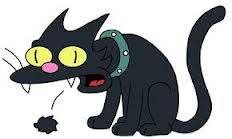 norm.
norm.
In my experience, the most likely reason for most cats is the diet they are being fed. Most cat owners feed their cats a dry kibbled diet that is left out in the bowl so the cat can pick on it all day. Since cats are obligate carnivores, they have no nutritional requirement for carbohydrates. When cats are fed a diet consisting of a high carbohydrate level, which are also typically high in “filler” ingredients, their bodies reject the food because they do not produce the enzymes necessary to digest that type of product. Another problem with dry kibbled foods is the lack of moisture in them. Cats need moisture in their food to help them to properly digest it. Indoor cats that spend a lot of time grooming also have the tendency to throw up, especially when they are fed too many carbohydrates. The carbohydrates alkalize the stomach acid which, in turn, helps to create hairballs. Cats that are fed an all meat diet have stomach acid that is corrosive enough to break down the hair before it gets into the small intestine, thereby, preventing hairballs.
If any cat parent wants to alleviate the problem of their cat constantly throwing up, the simple solution is to change the cat’s diet to, ideally, a raw food diet. 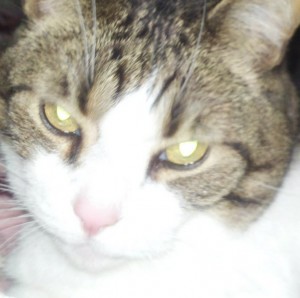 If there is a reason a raw food diet is not appropriate, a dehydrated (but rehydrated) or grain free canned food is the next best choice. By feeding a diet that most closely resembles the food a cat has evolved to eat, you will eliminate the problem of your cat “hacking up a hairball”!
If there is a reason a raw food diet is not appropriate, a dehydrated (but rehydrated) or grain free canned food is the next best choice. By feeding a diet that most closely resembles the food a cat has evolved to eat, you will eliminate the problem of your cat “hacking up a hairball”!
Until next time my faithful furry follower!
Litter Woes…… Why Cats get Loose Stool
 There’s nothing worse than walking into a room and getting the distinct stench of your cat’s litter box. Immediately you know that something is seriously amiss. When a cat has diarrhea, everyone in the house knows it. Finding out the reason is the hardest part.
There’s nothing worse than walking into a room and getting the distinct stench of your cat’s litter box. Immediately you know that something is seriously amiss. When a cat has diarrhea, everyone in the house knows it. Finding out the reason is the hardest part.  Cats get loose stool for a variety of reasons. One of the reasons is a change in their diet. If you are using a commercial dry or canned cat food and have not changed the brand, perhaps the manufacturer changed the ingredients in the food. Cats are very sensitive to these changes and sometimes require a period of adjustment to the new formula. Diets and treats that contain too many carbohydrates or fillers can also have this effect. Many inexpensive foods use flavor enhancers to make the food more palatable to the cat. These types of ingredients are sometimes poorly utilized by the cat’s body and can cause loose stool.
Cats get loose stool for a variety of reasons. One of the reasons is a change in their diet. If you are using a commercial dry or canned cat food and have not changed the brand, perhaps the manufacturer changed the ingredients in the food. Cats are very sensitive to these changes and sometimes require a period of adjustment to the new formula. Diets and treats that contain too many carbohydrates or fillers can also have this effect. Many inexpensive foods use flavor enhancers to make the food more palatable to the cat. These types of ingredients are sometimes poorly utilized by the cat’s body and can cause loose stool.
Is your cat a hunter? Even though a mouse is the best meal for a cat, it can harbor parasites that can transfer to your cat when he is enjoying his prize. These parasites can also be the cause of loose stool. Providing your vet with a stool sample can rule out this potential threat. Cats have the ability to manifest physical symptoms while under stress. Many people don’t think that their cats can be stressed out, after all, how much does he really need to do? Eat, sleep, & poop? The type of stress that effect cats are: Changes in the environment. Did you add a new animal or human to the household? Did you buy a new couch? Did you change where the litter box is located? Or even change the type or brand of litter? Is there hostility in the house from domestic situations? All these and more are considered stressors to the average cat.
Frequent travelling is another factor. Is your cat left under the care of a pet sitter frequently? Do you travel with your cat? Cats are very reluctant to change. They like things to stay status quo. These are just some of the 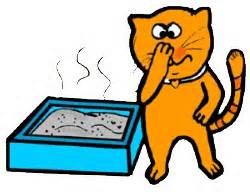 examples of the kind of stressors that might have an effect on your cat’s bowel habits. Stress also causes inflammation. Irritable bowel syndrome is a condition that develops when constant inflammation is present. In order to reduce the inflammation the stressors have to be eliminated. The diet has to be addressed to eliminate any aspects that will contribute to the inflammation as well.
examples of the kind of stressors that might have an effect on your cat’s bowel habits. Stress also causes inflammation. Irritable bowel syndrome is a condition that develops when constant inflammation is present. In order to reduce the inflammation the stressors have to be eliminated. The diet has to be addressed to eliminate any aspects that will contribute to the inflammation as well.
In my experience, cats that are fed a raw food diet rarely have digestive issues. Supplements like slippery elm or marshmallow root help soothe the lining of the intestinal tract to help it heal. Probiotics are also very beneficial. They help to repopulate the micro flora in the intestines so the cat can process its food more efficiently. By addressing all aspects of your cats lifestyle and making changes where needed can help to eliminate the horrible experience of your cat’s intestinal distress.
Until next time my Furry Followers!
Should I set up a consultation with Amy?
 If you have any questions or concerns about your pet’s diet. If your pet had been diagnosed with a medical condition and you don’t know what the best diet is for him. The hardest part of researching anything is sifting through all that information and deciphering what is fact and what is opinion.
If you have any questions or concerns about your pet’s diet. If your pet had been diagnosed with a medical condition and you don’t know what the best diet is for him. The hardest part of researching anything is sifting through all that information and deciphering what is fact and what is opinion.
Many people offer their advice with good intentions, but unfortunately, most of the information they are passing on is not based on facts. I have spent most of my career attending lectures and conferences given by the experts in each field. By doing this, I have amassed a wealth of knowledge in nutrition and wellness for dogs and cats. I have also had the opportunity to gather a lot of anecdotal evidence on many different medical conditions and treatments. If you would like to finally know what you should really be doing for the health of your furry friend it is time to set up a consultation.
No matter what your schedule, we have a few different consultation options for you. All consultations provide: A 1 hour one on one personal review of your pets current diet, treats, lifestyle and medical records. Diet and/or supplement recommendations customized to your pet based on evaluation of all information you provide. You will also receive any updated research information corresponding to your pets wellness needs. Even if your pet does not have a current medical condition, this consultation will help you make the best decisions for your pet to keep him as healthy as possible. In Store Consultations: $75.00/hr. Email consult: $55.00.
Welcome to Amy’s Animals Family!
 Hello! We’re Amy & Rich Fiumarelli, and we would like to welcome you to our Amy’s Animals family, where we really care about the health of your pet. We work hard to make sure that we can provide you with everything you need to keep your pet in tip top shape! I’m not only talking about the products we sell.
Hello! We’re Amy & Rich Fiumarelli, and we would like to welcome you to our Amy’s Animals family, where we really care about the health of your pet. We work hard to make sure that we can provide you with everything you need to keep your pet in tip top shape! I’m not only talking about the products we sell.  I’m talking about the information we can share with you about any new research findings, medical or wellness tips, or other tidbits that we’ve picked up in the 20 years I’ve been in the pet industry. All the information we provide is based on proven, factual research and also on anecdotal evidence. We have a passion for helping you learn everything you ever wondered about regarding your pet.
I’m talking about the information we can share with you about any new research findings, medical or wellness tips, or other tidbits that we’ve picked up in the 20 years I’ve been in the pet industry. All the information we provide is based on proven, factual research and also on anecdotal evidence. We have a passion for helping you learn everything you ever wondered about regarding your pet.
Check out our facebook page, Amy’s Animals Holistic Nutrition Center, our website, Amy’s Pet Nutrition Center, and my blog, Amy’s Animals Holistic Canine & Feline Nutrition Center for plenty of great information and some fun pet articles! Also, sign-up to receive our email news..keep in the know, by being part of the Amy’s Animals Family. Join our Furry Followers and have a picture of your pet posted on our website! You’ll also meet our little pack. Clyde, our boxer, his chi-bee brothers Ollie, Ernie & Tyler and sister Ellie Crumbles. Be sure to check us out regularly. There is always something happening at Amy’s Animals!
Cats..The lion lurking in the living room!
 Although cats have been domesticated for thousands of years, their nutritional needs have not changed at all. Cats are obligate carnivores. They are meant to only eat meat. In their natural environment, cats will get most of their moisture from their food source. Since they are descended from desert dwellers, they do not have the instinct to drink. They will never drink enough water to satisfy their hydration needs. If they do not get adequate moisture in their food they will live out their lives partially dehydrated. This eventually leads to the common health problems we see in cats such as urinary tract disease and kidney disease. Since they are true obligate carnivores, cats will not voluntarily eat carbohydrates. When they catch prey, they eat all but the intestinal system of that prey. This would be the only source of carbohydrates the cat would be presented with. A mouse in a can would be the ideal diet for a cat! Think of the lions and tigers you see in Africa. They are not sitting around a huge bowl of dry kibble! They are hunting and eating prey animals. These prey animals offer all the nutrition the cat needs.
Although cats have been domesticated for thousands of years, their nutritional needs have not changed at all. Cats are obligate carnivores. They are meant to only eat meat. In their natural environment, cats will get most of their moisture from their food source. Since they are descended from desert dwellers, they do not have the instinct to drink. They will never drink enough water to satisfy their hydration needs. If they do not get adequate moisture in their food they will live out their lives partially dehydrated. This eventually leads to the common health problems we see in cats such as urinary tract disease and kidney disease. Since they are true obligate carnivores, cats will not voluntarily eat carbohydrates. When they catch prey, they eat all but the intestinal system of that prey. This would be the only source of carbohydrates the cat would be presented with. A mouse in a can would be the ideal diet for a cat! Think of the lions and tigers you see in Africa. They are not sitting around a huge bowl of dry kibble! They are hunting and eating prey animals. These prey animals offer all the nutrition the cat needs.
Meat for protein, bones for calcium, organs for fat, blood for micronutrients and 78-80% moisture content! The cat that prowls around your living room needs the same type of diet! Knowing now what the ideal diet for a cat really is, try to buy the closest to this diet that you can find.
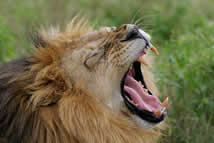 Raw frozen diets are now available. Just thaw it and feed your cat twice a day. The next best alternative is grain free dehydrated food. Just add water and feed twice a day. The third choice is canned food. Also feed twice a day. Grain free dry food is the last alternative as it doesn’t contain enough moisture for the cat to thrive, but it is a better alternative than a carbohydrate based kibbled food. There is now a starch free kibble food available that would be the ideal choice if choosing a kibble. Even though most cat owners like to leave food out all day for their cats, this is not the best choice. Cats should not be fed free choice. They are not meant to graze. They benefit from the fasting period between meals. In the wild, they only ate if they had a successful hunt. If they didn’t, they would fast, sometimes for days. This allows the cats body to use its
Raw frozen diets are now available. Just thaw it and feed your cat twice a day. The next best alternative is grain free dehydrated food. Just add water and feed twice a day. The third choice is canned food. Also feed twice a day. Grain free dry food is the last alternative as it doesn’t contain enough moisture for the cat to thrive, but it is a better alternative than a carbohydrate based kibbled food. There is now a starch free kibble food available that would be the ideal choice if choosing a kibble. Even though most cat owners like to leave food out all day for their cats, this is not the best choice. Cats should not be fed free choice. They are not meant to graze. They benefit from the fasting period between meals. In the wild, they only ate if they had a successful hunt. If they didn’t, they would fast, sometimes for days. This allows the cats body to use its 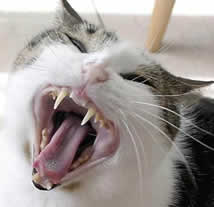 energy in areas other than digestion.
energy in areas other than digestion.
For male cats, this is especially important. One study has shown that just in the presence of food, alkaline is directly released into the urinary system of the cat. In male cats this makes them more susceptible to urinary tract disease. By feeding the cat and then removing the bowl this risk is eliminated. The cat foods available in the supermarket are usually high carbohydrate based foods. Grain is much cheaper than meat. The manufacturers add flavor enhancer’s to them to make them palatable to the cat. Remember, cats won’t voluntarily eat carbohydrates. Read the ingredient label. If the product has wheat, corn or soy in it, don’t buy it. If it has by-products in it, don’t buy it. These ingredients are very poor quality and very hard for the cats body to digest and process. This puts unnecessary strain on the organs of the cat which eventually will cause health problems.
The same rules apply when picking out treats for your cat. Better choices for treats include freeze dried meat or freeze dried fish. By feeding a more species appropriate diet to your cat you will be assured that you will keep your cat happy & healthy for years to come!

